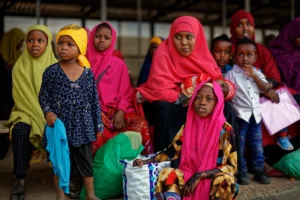The president of the United Nations agency, International Organization for Migration (IOM), has expressed alarm about the rising number of women and children traveling from the Horn of Africa to Gulf nations via Yemen (UN).
According to IOM Director General Antonio Vitorino, the number of people making the perilous journey through Yemen from Ethiopia, Somalia, and Djibouti has increased by 64% in the last year as a result of people looking for better livelihoods and an increase in the number of women and children traveling alone.
According to him, climate change is a factor in the rise in migration.
In the past, women and kids would frequently decide against making the perilous journey over the desert, which was largely traveled on foot. In the past, men would go without their families in an effort to locate work and send money back home.
Vitorino, who was in Kenya for the launch of a $84 million appeal to support more than one million migrants taking the route through Yemen, stated that “the pressure is building” as the number of migrants increases.
According to him, the desperate migrants require protection from traffickers, smugglers, rapists, and violent criminal gangs along the road.
According to him, the UN’s migration agency needs to raise awareness of the risks because some migrants are ignorant of them, particularly the war in Yemen. He stated that if migrants still decide to go, the organization should provide them with basic healthcare and other assistance, and in certain circumstances, send them back to where they came from.

The number of people traveling from West Africa to Europe via Libya is also on the rise, and the fate of these migrants, particularly those who are imprisoned in conflict-torn Libya, is a matter of concern for everyone, he said.
“We are aware of the locations of the official detention facilities, and we have access to them, though never permanently or unaccompanied. But we have the ability to help,” Vitorino remarked.
However, he continued, the UN organization does not have access to the unofficial detention facilities, which are worrisome because there have been accusations of rampant abuse in them.
The political collaboration required to shut down the unofficial prison facilities is challenging because of Libya’s political turmoil, he continued.
In order to decrease the number of migrants in detention, he said, the IOM is working to enroll more people in voluntary return programs. According to him, it’s challenging since there are more more people who want to return from Libya than there are flights available.
Vitorino expressed his hope that the causes of increased migration, such as violence and climate change, can be addressed in order to decrease the number of people leaving their homes.
He emphasized the necessity of following legitimate migration routes, stating that while the procedure is challenging and time-consuming, it cannot be compared to the dangerous conditions present along illegal ones.




